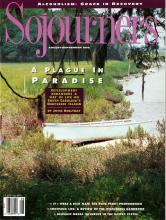At 5 a.m. my bed began to shake. Suddenly the whole room started shifting and moving, like a ship in a big storm. I rubbed the sleep out of my eyes and remembered I was in Los Angeles. It didn't take long to realize that I was experiencing my first earthquake.
A small delegation from the World Council of Churches and an "urban strategy committee" named by the National Council of Churches USA had come to LA. We were there to listen and act accordingly. The startling symbolism of the quake was an appropriate beginning to several days of conversation in the City of Angels, where events just weeks before had shaken the nation.
In a dilapidated junior high school, surrounded by the huge housing projects where the famous Crips and Bloods street gangs were born, several of us sat in a large circle with more than a dozen gang members, ranging in age from 13 to 18. Looking into their faces, I was struck that these were the young black men of whom America is so afraid. Certainly, young men like these and their counterparts in neighborhoods like my own have shown themselves capable of terrible violence. Yet sitting there, they looked so very young and vulnerable.
Members of both the Crips and Bloods testified that the "rebellion" after the Simi Valley verdict was not the most important event. Rather, it was when the gangs stopped fighting--"when the young black males finally began putting their heads and hearts together." That began to happen even before the verdict. "'Truce' is a media word," said one young brother. "It really is a coming together." One after another, they described this as the "most important historical event for African-American males."
Read the Full Article

